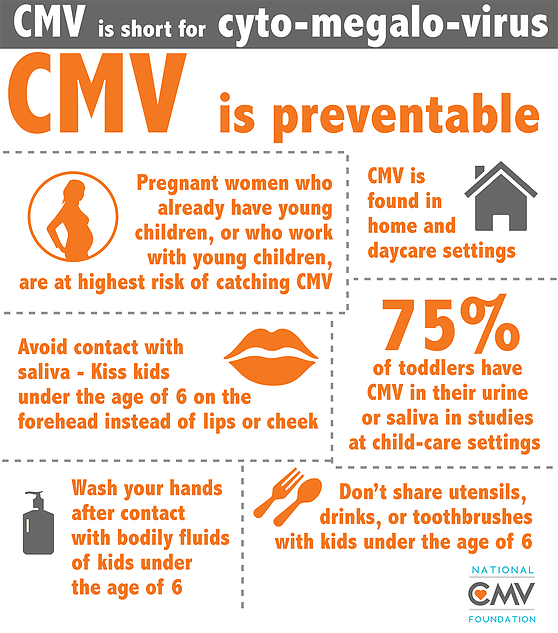Congenital CMV - What Moms Need to Know
Can pregnant women really protect themsleves?
Cytomegalovirus (CMV) is a common virus that infects people of all ages. In the U.S., nearly 1 in 3 children is already infected with CMV by age 5. Over half of adults have been infected with CMV by age 40. Once CMV is in a person’s body, it stays there and can reactivate. A person can also be re-infected with a different strain of the virus.
People at higher risk for complications from CMV are those who are pregnant or have weakened immune systems. If you are pregnant and infected with CMV, you can pass CMV to your developing baby.
When a baby is born with a CMV infection, it is called congenital CMV. About 1 in 200 babies are born with congenital CMV infection. About 1 in 5 babies with congenital CMV infection will have birth defects or other serious long-term health problems.
Children are a common source of CMV. High amounts of the virus can stay in a child's body fluids, like saliva and urine, for months after the infection. Teachers, caregivers, and mothers with toddlers are more likely to get infected.
CMV is spread through contact with infectious body fluids (urine, saliva, blood, tears, semen, and breast milk), sexual contact, transplanted organs and blood transfusion, and contact with the mother’s genital secretions during delivery.
Although the virus is not highly contagious, it has been shown to spread among household members and young children in daycare centers.
Pregnant women can lower their chances of getting CMV by reducing contact with saliva (spit) and urine from babies and young children. Make sure you: 1) Do not share food, utensils, cups, or pacifiers with a child. 2) Wash your hands with soap and water after changing diapers or helping a child to use the toilet.
Testing and diagnosis
Healthcare providers order blood tests to identify CMV infection in adults with symptoms. However, blood is not the best fluid to test newborns with suspected CMV infection. Saliva or urine tests are preferred for newborns and must be done within 2 to 3 weeks of birth to confirm if the baby has congenital CMV.
A study conducted in Hadassah Medical Center in Jerusalem implemented pooled saliva PCR (polymerase chain reaction) testing for 15,000 newborns. This method proved to be a cost-effective and sensitive approach, identifying numerous asymptomatic congenital infections that might have otherwise gone undetected. The study underscores the possibility of integrating screening for CMV into routine newborn care, facilitating early diagnosis and intervention .
Currently, it is not recommended that doctors routinely test pregnant women for CMV infection. This is because lab tests cannot predict which developing babies will become infected with CMV or have long-term health problems. Over 90% of primary maternal CMV infections during pregnancy are asymptomatic and may remain asymptomatic in the fetus.
NIH-funded vaccine research at Weill Cornell Medical School is underway which aims to develop a vaccine to prevent maternal-fetal transmission of CMV using non-human primate models. No scientific publications from this research have been released.
Keep reading with a 7-day free trial
Subscribe to Moms Matter to keep reading this post and get 7 days of free access to the full post archives.





